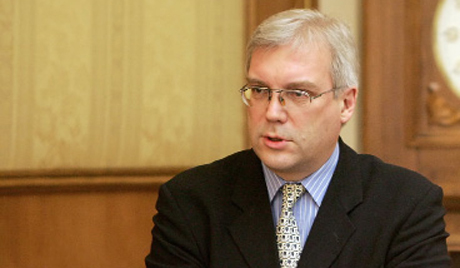
From Russia Today: Deputy Foreign Minister Aleksandr Grushko is to be appointed new Russian envoy to NATO. He will replace Dmitry Rogozin, who returned to Moscow in December last year, in the post.
“Russia has finally decided on the candidacy. Grushko is coming here,” a source in the alliance’s headquarters in Brussels told Kommersant daily. The paper writes that information was also confirmed by high-ranked officials in the Russian Foreign Ministry. . . .
The Kremlin told the paper that a presidential decree on Grushko’s new appointment has not been signed yet.
Grushko, 56, has worked in the Ministry of Foreign Affairs since 1977 and has served as deputy FM since 2005. He will become first professional diplomat to represent Moscow in Brussels.
From the Kyiv Post: Grushko rejected the offer at first, Kommersant said.
"It is an unrewarding job in terms of actual work. Being an envoy to an organization where Russia is not a member is rather difficult," a source familiar with the job’s specifics told Kommersant.
Grushko will become the first career diplomat to fill this post, and he will have to deal with the stalled Russia-NATO talks on missile defense, the newspaper writes.
The Russia-NATO Council meeting, set for April 19, is the first official event which Grushko will attend in his new capacity, the Kommersant said.
"Missile defense will feature prominently on its agenda," it said.
From Joshua Kucera, the Bug Pit: Grushko has been a frequent interlocutor with American officials, as can be seen from the voluminous number of Wikileaked cables that cite conversations between him and U.S. diplomats. But he still comes off as a strong NATO skeptic, and the tone in the cables suggests no particular warmth in the conversations. Take this cable, from October 2008, just after the Russia-Georgia war:
Grushko expounded on President Medvedev’s recent calls for a revised Euro-Atlantic security framework that would move away from blocs. In essence, the disintegration of the Warsaw Pact and other Soviet dominated institutions created a security vacuum in Europe filled in large part by the expansion of NATO. Russia was prepared to cooperate with NATO and other transatlantic institutions. However, unchecked NATO enlargement had created dividing lines in Europe and given rise to "anti-Russian policies" in Ukraine and Georgia as well as the "unrealistic" perception in Washington that NATO’s reach and appeal was global. He gave no details on how and when Russia would pursue this discussion with the Europeans or the U.S.
He also comes off as a loyal implementer of Kremlin policies, which is confirmed by Kommersant’s expert. He will thus be less likely to go off the reservation than Rogozin, who often kept us busy wondering whether his barbed statements were official Kremlin policy or just his opinion, as he did when he threatened to cut off Russia’s cooperation with the Northern Distribution Network if the U.S. continued to push ahead with missile defense. (photo: RIA Novosti)
Image: ria%204%207%2012%20Alexander%20Grushko.jpg
